So what’s it like to be a volunteer research assistant on the Primate and Predator Project?
We decided to ask Marion Gohier, a research assistant who primarily volunteered with the predator research. Most of our assistants stay for between three and six months, but Marion was able to stay a whole year. She left at the end of August however, before she returned to France we had to find out what she thought about her year in Africa.
Marion can you give us five words to describe your year working for the Primate and Predator Project?
Hiking, Wild, Leopards, Bait, Freedom.
I know that you have spent some time in Africa before, how has this experience differed from what you’ve done previously?
It was completely different to my other experiences. Previously I was with other students while studying at a university in South Africa and then after that I worked at a French lodge. The lodge was extremely touristy and we saw the big 5 animals all the time. At Lajuma there are almost no tourists. Everyone here is focused on research and conservation. I have only had one wild leopard sighting here in my whole year. However this sighting was so much more real and exciting than leopard sightings I’d had before in places like Kruger National Park.
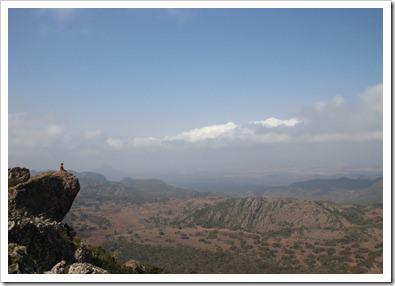
Before arriving here I’m sure you had some expectations about the place and the work you were going to do. Did the experience meet your expectations or was it quite different?
I didn’t expect Lajuma to be quite so mountainous! I also didn’t realize how remote and far from town we would be. I didn’t expect the crazy road up to the research center either.
I didn’t think I would be doing such a variety of different tasks. I feel like I did absolutely everything I could have done here. It’s been a full year! I wouldn’t have had the opportunity to do most of the things I got to do here somewhere else. It is far from the monotony of a normal job.
What sort of tasks did you complete as a research assistant?
Hiking or driving the quad bike to camera traps to service them, tagging camera trap photographs with species and animal ids, managing and backing up data sets, helping with Earthwatch volunteers, baiting and preparing bomas for trapping, checking predator traps, getting to go out if we caught a leopard and doing measurements, trying to download data from the leopard and brown hyaena GPS collars, collecting and washing predator scats, taking phenological data on trees.
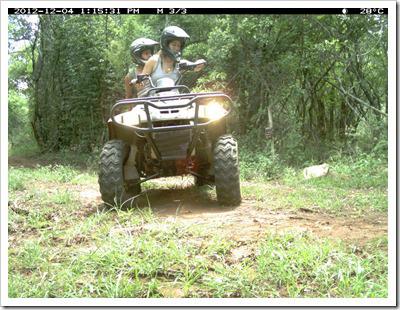
What challenges did you face while here?
The hiking was a bit challenging since there were long distances to cover over difficult terrain but it was always fun. Some nights I helped with trapping leopards and this meant that I had to work late after a long day and I was tired but I always loved it, so being tired didn’t matter.
What was the best thing about your year?
Seeing the leopard in the bush. After five months of looking at leopards on the computer and identifying them from camera trap images, and hiking three days a week and not seeing any leopards, it was incredible to actually see one.
What was the worst thing about your year?
When trapping for leopards to collar I had to prepare the baits. This meant cutting up foetuses. The smell follows you everywhere! If you don’t wash your clothes or your hair straight away it stays with you and stinks up your whole room.
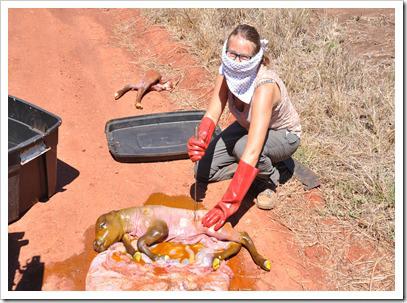
What is it like working with the other Research assistants and staff members?
Everyone is very nice and fun. In the predator team there are generally only two research assistants. This is great because I’m not alone and I get very close with my colleague since we are hiking for hours together. It’s always nice to have the other assistants and staff around because it helps when you’re a long way away from your family and friends. I got to meet people from all over the world and we shared things from our home countries and the things we like.
What did you think of Bush Camp where the assistants stay?
It is very nice. It’s not made for people that like fancy stuff. Even though sometimes the windows don’t always close or the showers aren’t always perfect, for me it will always be Africa. It’s the wild and it’s close to nature.
What did you learn from this year?
I learned a lot about science, animals, living in a wild area and also about myself. Personally this experience helped me to learn what I really want to do. I always thought that I wanted to live with animals in Africa. When I first got here I missed my family but I got through it and I knew that I need to be somewhere wild and open to be happy.
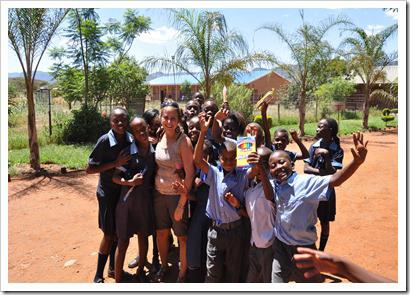
Tell us a story about your year…
I’m going to tell a scary story. There was one day when I nearly stepped on a puff adder. For a week afterwards I couldn’t stop dreaming of snakes. I was staring at the ground non-stop while hiking. Then in the same week I was in a car doing some camera trap work and I saw a black mamba. It was a week of too many snakes, but thankfully I didn’t have any other close encounters after that.
Another story I want to tell happened on one of my last days at Lajuma. I went out to prepare sites for leopard collaring. We checked a camera trap and saw that a leopard had walked by 20 minutes. As we worked on the trap site we could hear the leopard calling from the bushes. He was probably only a few hundred meters away. I kept looking in the bushes to try and see him. It was amazing to know he was that close to us.
What would you say to someone who asked you whether they should be a research assistant with the primate and predator project?
Just go!
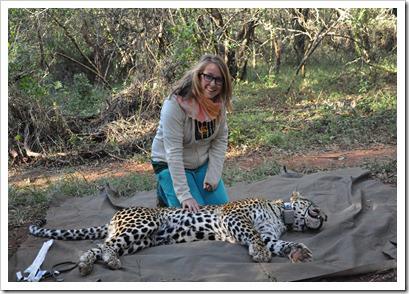
If you’re interested in following in Marion’s Footsteps and applying to be a volunteer research assistant, either focussing on primates or predators, please contact Katy Williams by emailing [email protected]
